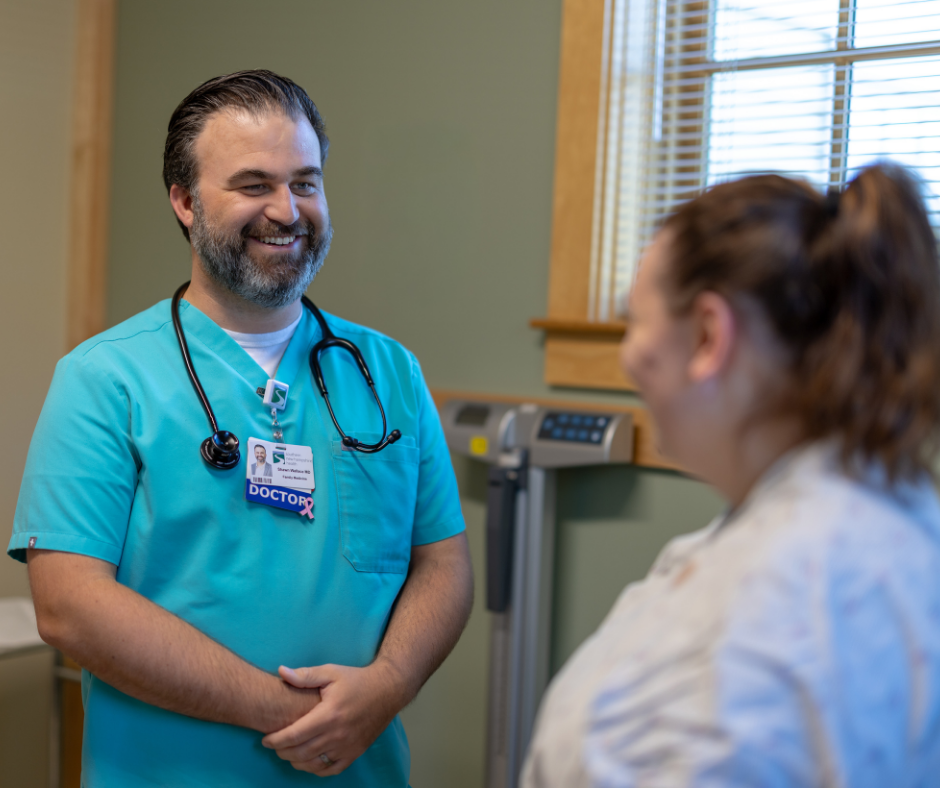October 27, 2025
Vaccines: Separating Fact from Fiction in a Clickbait World
A look at vaccine safety for Amherst families
By Dr. Shawn Wallace– Amherst Family Practice, Southern New Hampshire Health
In today’s world, it can be hard to know what to believe. There is so much information online, and it's hard to tell what is true or false. When it comes to vaccines, some headlines can be scary or misleading.
At Amherst Family Practice of Southern New Hampshire Health, we want families in our community to feel confident about their health decisions. Here’s what you need to know about vaccines and how they help keep you and your loved ones safe.
How vaccines protect you and your family
Vaccines are a safe, effective way to prevent serious diseases. They work by teaching your immune system to recognize and fight off specific germs. Trusted sources like the Mayo Clinic agree that this protection helps keep you healthy without making you sick.
Vaccines also protect the people around you. Babies, older adults, and people with weak immune systems count on others to help stop the spread of illness. By getting vaccinated, you’re helping your whole community.
The Centers for Disease Control and Prevention (CDC) says vaccines have saved millions of lives and made diseases like polio and measles very rare in the United States.
Vaccines undoubtedly save lives
History shows just how powerful vaccines can be:
- Smallpox: Once one of the deadliest diseases, it was wiped out worldwide in 1980 thanks to vaccines.
- Polio: This virus paralyzed and killed thousands every year. The U.S. has been polio-free since 1979.
- Measles: Before vaccines, it killed 2.6 million people worldwide every year. Between 2000 and 2021, measles vaccines prevented an estimated 56 million deaths.
- COVID-19: In the U.S., COVID-19 vaccines prevented about 18.5 million hospital stays and 3.2 million deaths between December 2020 and November 2022.
Myths you might have heard — and the facts
Myth: Vaccines can give you the illness they are meant to prevent.
Fact: Some people feel mild side effects like a sore arm or slight fever. That’s your immune system building protection, not the disease itself. 
Myth: Natural immunity is better than vaccine immunity.
Fact: Getting sick can be dangerous. Diseases like measles or whooping cough can cause serious problems or even death. Vaccines give you safe protection without that risk.
Myth: Vaccines aren’t tested enough to know if they’re safe.
Fact: Vaccines go through years of testing and review before they’re approved. The U.S. Food and Drug Administration (FDA) checks safety and effectiveness, and experts keep monitoring vaccines even after they’re on the market.
Myth: The MMR vaccine causes autism and other diseases.
Fact: This myth started with a study that was later proven false and pulled from the medical journal. Since then, many large and reputable studies have shown there is no link between vaccines and autism. Both the CDC and the Mayo Clinic confirm this fact. Decades of reputable research shows no evidence of a link between vaccines and autism, infertility, Type 1 diabetes, developmental disorders, neuropsychological outcomes, seizures, or inflammatory bowel disease.
Myth: The COVID-19 vaccine was rushed and is experimental.
Fact: mRNA technology has been studied since the 1960s. Researchers were already using it in cancer and other vaccine studies long before the pandemic. The urgency of COVID-19 sped up production, but no safety steps were skipped.
Myth: The COVID-19 vaccine changes your DNA.
Fact: The genetic material in mRNA vaccines never enters the part of your cell where DNA lives. It’s naturally broken down within a few days.
Where to find reliable information
With so much information available online, it is important to know who to trust. When you have questions about vaccines or your family’s health, look for sources that are backed by scientific research. Not all sources online are trustworthy. To get accurate information about vaccines, start with these:
- CDC: www.cdc.gov
- Mayo Clinic: www.mayoclinic.org
- American Academy of Pediatrics: aap.org
- World Health Organization: who.int
And, of course, you can always ask your healthcare provider.
We Are Here to Help
If you have any concerns about vaccines, please call Amherst Family Practice and talk with one of our providers. Our team is here to answer your questions and provide clear, science-based information. We believe in keeping our community healthy and informed.
Call Amherst Family Practice at 603-673-5885 to schedule an appointment. Your health and peace of mind are our priority.

